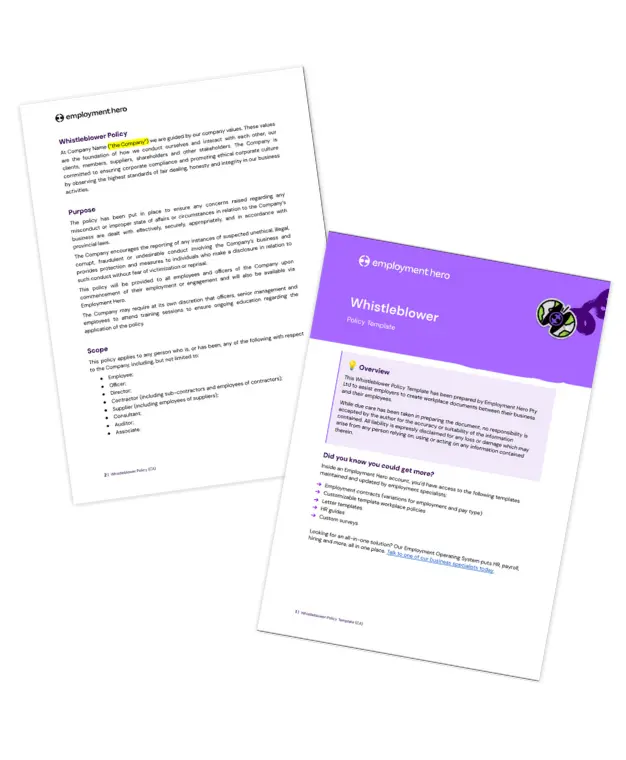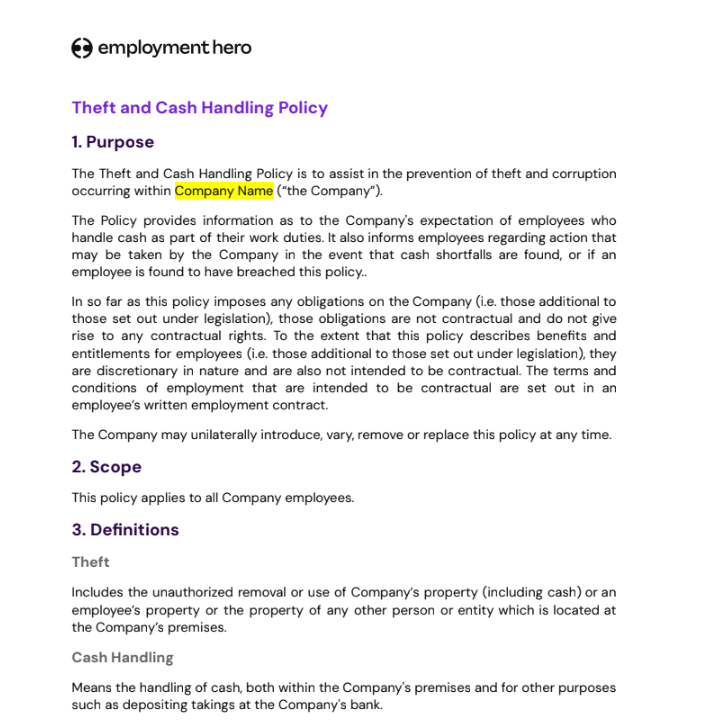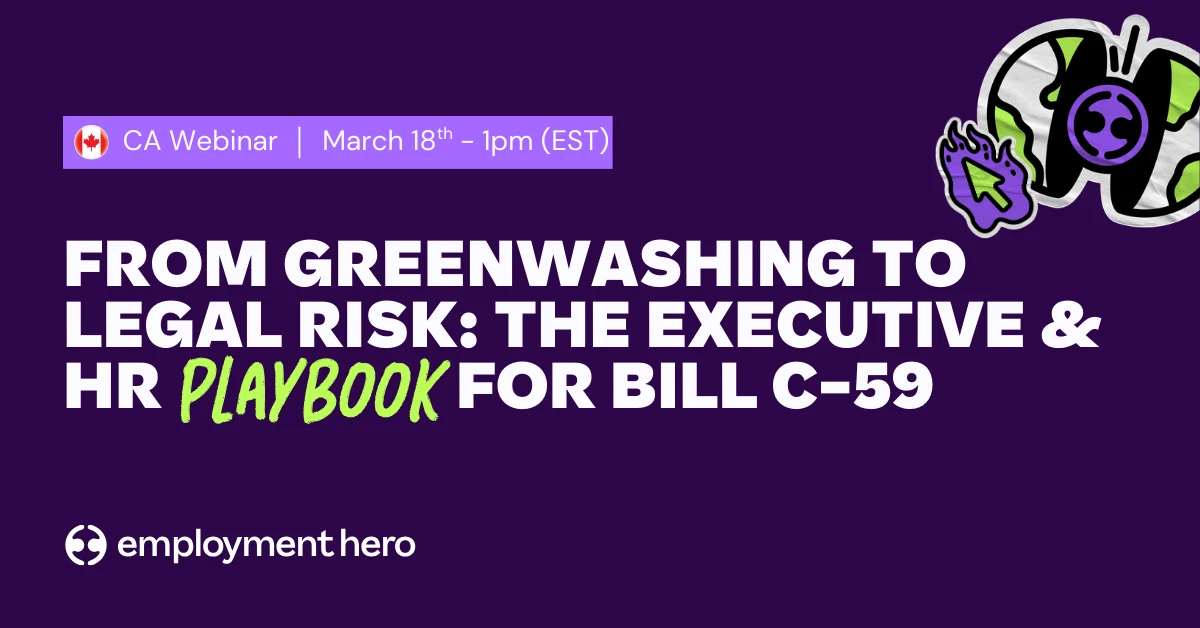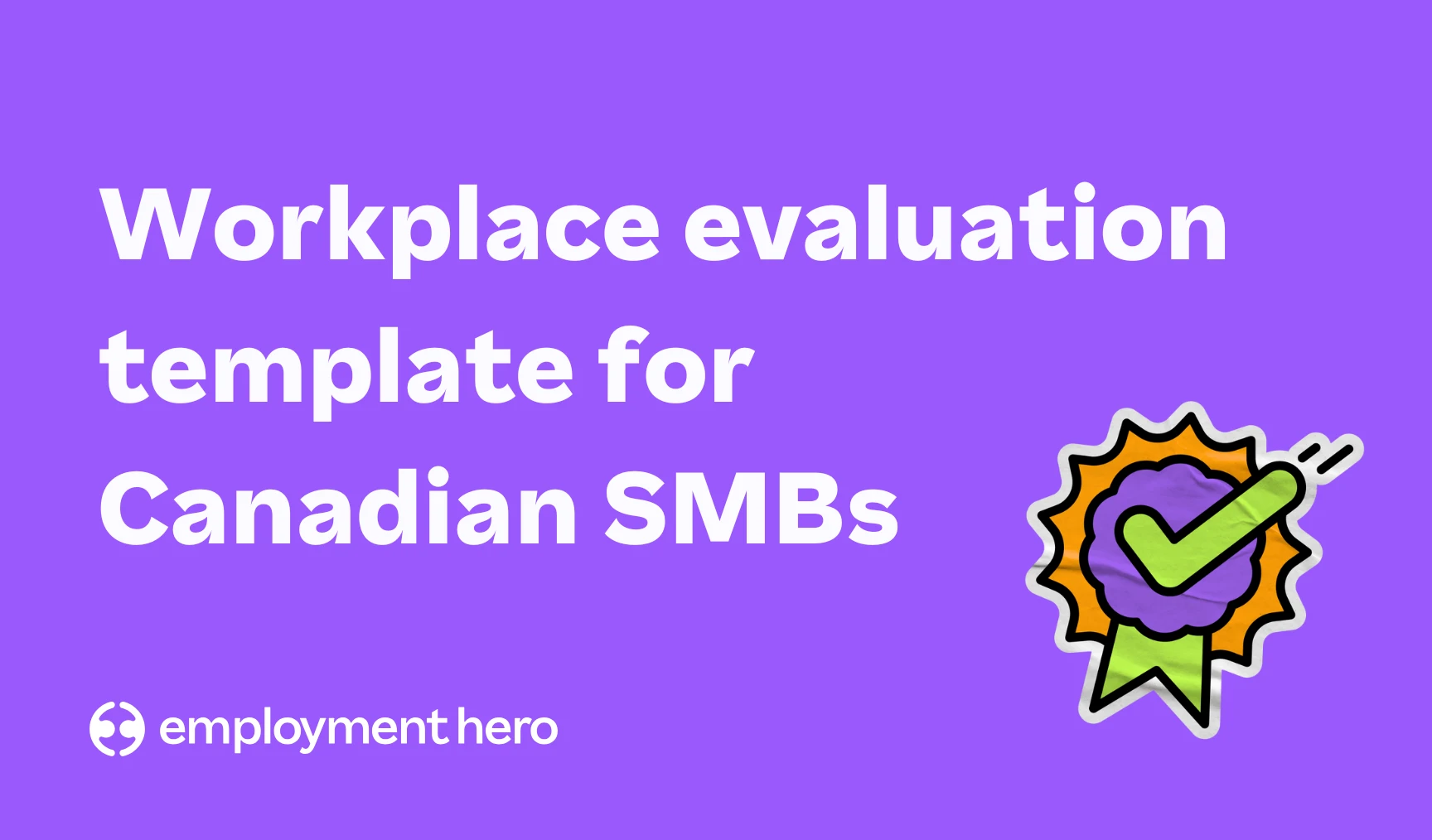Whistleblower policy template and guide
Published
Whistleblower policy template and guide
Published
Every business owner, founder and HR manager wants to foster a culture of integrity and transparency for their employees and their business. A well-designed whistleblower policy is the cornerstone of this effort, providing a safe and confidential channel for individuals to report wrongdoing without fear of reprisal. Our comprehensive guide and customizable template are designed to help your organization establish a robust policy that supports compliance and promotes a strong ethical foundation, minimizing risk and building trust.

What is in this whistleblower policy template?
This comprehensive guide and template provide everything you need to implement a robust whistleblower policy for your Canadian organization. By downloading this resource, you’ll receive:
- A customizable policy template ready for immediate use.
- Clear explanations of key policy components, from reporting mechanisms to anti-reprisal provisions.
What is a whistleblower policy?
A whistleblower policy is a formal framework that allows individuals to report suspected wrongdoing within an organization in good faith, providing crucial protections against retaliation. It clearly outlines how concerns can be raised, the types of misconduct covered, the options for confidentiality or anonymity and the organization’s commitment to investigating all reports and safeguarding whistleblowers.
In Canada, these policies are essential for promoting trust and transparency across all sectors. They create a safe environment where employees, contractors and other stakeholders can speak up without fear of negative consequences.
Legal protections for whistleblowers in Canada
Canadian law offers important safeguards for whistleblowers. The Criminal Code prohibits employers from disciplining or disadvantaging an employee who reports wrongdoing to law enforcement.
Beyond this, federal statutes like the Public Servants Disclosure Protection Act provide specific protections for government employees. Several provinces, including Alberta, Saskatchewan, Manitoba, New Brunswick, Ontario and British Columbia, have their own legislation, particularly for public sector workers. Additionally, the Competition Act protects the confidentiality of whistleblowers during investigations of anti-competitive conduct, making it a powerful tool for maintaining fair markets.
Benefits of whistleblower policy
An effective whistleblower policy does more than just meet legal requirements – it promotes a strong and ethical organizational culture.
By creating a safe space for reporting, your organization can benefit from the early detection of misconduct, which can significantly minimize financial and reputational damage. When employees and other stakeholders see that your organization is committed to acting on reports and protecting those who speak up, it builds trust and can lead to improved employee retention.
How to make a whistleblower policy
Drafting an effective whistleblower policy involves a series of clear steps. Start by defining the scope of the policy, including who it covers (employees, contractors, third parties, etc.) and the types of misconduct that can be reported (e.g., fraud, harassment, illegal acts).
Next, outline the reporting mechanisms, such as a hotline, email or web portal, ensuring they provide options for confidentiality and anonymity. The policy should then describe the process for acknowledging reports, conducting fair and impartial investigations and communicating outcomes to the person who made the report. It’s vital to include strong anti-reprisal provisions and reference applicable legal protections to reassure potential whistleblowers. Finally, to ensure the policy’s success, emphasize the importance of training, accessibility and visibility across the entire organization.
Ensuring confidentiality and protection from reprisal
To guarantee the integrity of your policy, you must have clear provisions for confidentiality and protection. The policy should ensure that personal information is handled in accordance with privacy laws and that only designated individuals have access to a whistleblower’s identity.
It must explicitly state that whistleblowers are shielded from any form of retaliation, including demotion, harassment or termination. However, it’s also important to make it clear that this protection applies only if the reports are made in good faith and with reasonable belief in the truth of the allegations.
Reporting and investigation process
Your policy should provide a detailed overview of the reporting process, including multiple submission methods (e.g., hotline, email or web portal). It should explain how reports will be formally acknowledged and outline the steps for investigation, such as collecting evidence and conducting interviews while maintaining fairness and transparency. Clear timelines for providing updates and communicating outcomes are crucial. The policy should also explain that, in some cases, a whistleblower’s identity may need to be disclosed if it is required for a fair process or compliance.
Training and policy communication
A policy is only effective if people know it exists and understand how it works. You should regularly train employees and managers on the policy’s purpose, the reporting process and the protections available. Awareness efforts, such as internal campaigns and memos, help normalize the act of raising concerns and build confidence that employees will be safe if they use the policy.
Whistleblower policy template
Here’s a preview of the policy template you can download and customize based on your requirements:

Best practices for whistleblower policies in Canada
The most effective whistleblower policies in Canada share several key principles. They prioritize confidentiality, impartial investigations and timely responses. They must also be aligned with all relevant Canadian legal standards and foster a culture of ethics where raising concerns is seen as a positive contribution, not a risk.
Fairness and transparency
A strong policy ensures fair treatment for both whistleblowers and those accused of misconduct. Investigations should incorporate principles of procedural fairness, with clear communication to all involved parties and thorough documentation of findings. This transparency builds trust in the process and helps ensure that the policy is not misused.
Policy oversight and continuous improvement
A policy is a living document that requires ongoing oversight. Assign a responsible officer or committee to monitor its implementation, track reports and review outcomes. Periodic audits and trend analysis can help you identify blind spots and improve procedures over time, ensuring your policy remains relevant and effective as your organization evolves.
Download our whistleblower policy
Building a robust whistleblower program is an investment in your company’s integrity and long-term success. Our template and guide make it easy to create a policy that protects your people and your business.
Take the first step toward a more transparent and ethical workplace.
The information in this template is current as at 1 September 2025, and has been prepared by Employment Hero Pty Ltd (ABN 11 160 047 709) and its related bodies corporate (Employment Hero). The views expressed in this template are general information only, are provided in good faith to assist employers and their employees, and should not be relied on as professional advice. The Information is based on data supplied by third parties. While such data is believed to be accurate, it has not been independently verified and no warranties are given that it is complete, accurate, up to date or fit for the purpose for which it is required. Employment Hero does not accept responsibility for any inaccuracy in such data and is not liable for any loss or damages arising either directly or indirectly as a result of reliance on, use of or inability to use any information provided in this template. You should undertake your own research and to seek professional advice before making any decisions or relying on the information in this template.
Register for the template
Related Resources
-
 Read more: From Greenwashing to Legal Risk: The Executive & HR Playbook for Bill C-59
Read more: From Greenwashing to Legal Risk: The Executive & HR Playbook for Bill C-59From Greenwashing to Legal Risk: The Executive & HR Playbook for Bill C-59
Are your sustainability claims a legal risk under Canada’s Bill C-59? Register for our webinar to learn how HR leaders…
-
 Read more: The ultimate guide to hiring top talent in Alberta
Read more: The ultimate guide to hiring top talent in AlbertaThe ultimate guide to hiring top talent in Alberta
From the new 27-week job-protected leave to hiring interprovincial talent, here is your essential guide to hiring and retaining staff…
-
 Read more: Workplace evaluation template: performance reviews
Read more: Workplace evaluation template: performance reviewsWorkplace evaluation template: performance reviews
Streamline performance reviews with our top workplace evaluation template. Enhance feedback and boost employee engagement.


















